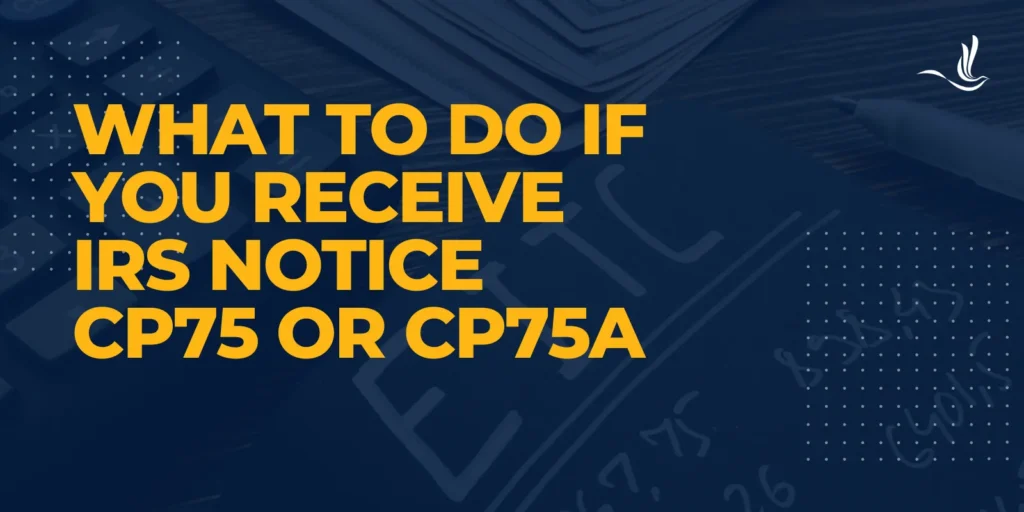
Receiving correspondence from the IRS can be an intimidating experience for many taxpayers. Notices like CP75 or CP75A often raise concerns and questions about one’s tax situation. However, understanding what these notices entail and how to respond to them can alleviate anxiety and ensure a smoother resolution. In this guide, we’ll explore what Notice CP75 and CP75A mean, why they are issued, and steps you can take if you receive one.
Understanding Notice CP75 and CP75A
Notice CP75 and CP75A are both sent by the IRS to request verification items from taxpayers who have claimed a certain tax credit, dependents, or filing status. It will often involve the Earned Income Credit (EIC), the Additional Child Tax Credit (ACTC), and/or the Premium Tax Credit. These credits are refundable tax credits designed to assist low to moderate-income families. However, the IRS may need additional information to verify eligibility for these credits.
A CP75A Notice is similar to CP75 but is specifically for taxpayers who claimed a credit, dependent, or filing status for the first time on their tax return. Like CP75, it requests additional information to verify eligibility for these credits.
Reasons for Issuance
There are several reasons why the IRS might issue Notice CP75 or CP75A:
- Incomplete Information: Your tax return may lack sufficient information or contain discrepancies that need clarification.
- Verification of Eligibility: The IRS may need to verify your eligibility for the EIC and/or ACTC, especially if it’s the first time you’re claiming these credits.
- Prevent Fraud: These notices help the IRS prevent fraudulent claims for refundable tax credits.
What to Do If You Receive Notice CP75 or CP75A
Receiving IRS Notice CP75 or CP75A doesn’t necessarily mean there’s a problem with your tax return. However, it’s essential to respond promptly and provide the requested information to avoid delays in processing your return and potential issues with your refund. Here’s what you should do:
Read the Notice Carefully
Take the time to carefully read through the notice to understand why it was sent and what information the IRS is requesting from you.
Gather Documentation
Collect the documentation requested in the notice, such as proof of income, residency, and dependent eligibility. Ensure that the documents are accurate and up-to-date. Depending on the credit, the notice may also be grouped with a form to fill out. Here are a few examples:
- To qualify for the EIC, you’ll likely need to send back an enclosed Form 886-H-EIC.
- To qualify for the Premium Tax Credit, you’ll need to send back an enclosed Form 14950.
- To claim a dependent, you’ll need to submit Form 886-H-DEP.
- To confirm your eligibility for a certain filing status, refer to IRS Form 14824.
Respond Promptly
The notice will provide a deadline for responding, typically 30 days. It’s crucial to adhere to this deadline to prevent further delays or complications. If you don’t respond, the IRS will likely assume you don’t want to claim the credit and then adjust your tax return accordingly.
Follow Instructions
Follow the instructions provided in the notice for submitting the requested documentation. This may involve mailing the documents to a specific address or uploading them through the IRS’s online portal.
Seek Assistance if Needed
If you’re unsure about how to respond to the notice or need assistance gathering the required documentation, don’t hesitate to seek help. You can contact the IRS directly or consult a tax professional for guidance.
Keep Records
Make copies of all documents you submit to the IRS and keep them for your records. This will help you track your communication with the IRS and provide proof of compliance if needed.
Monitor Your Mail and Online Account
Keep an eye on your mail and online IRS account for any updates or further communication regarding your case. The IRS will typically respond in 30 days with further details or next steps.
Did you Receive IRS Notice CP75 or CP75A? Call Optima
Receiving IRS Notice CP75 or CP75A can be unsettling, but it’s essential to address it promptly and provide the requested information to ensure a smooth resolution. By understanding what these notices mean and following the steps outlined in this guide, you can effectively respond to the IRS’s inquiries and safeguard your tax refund and financial interests. Remember, assistance is available if you need it, so don’t hesitate to reach out for help if you’re unsure about how to proceed. Optima Tax Relief has a team of dedicated and experienced tax professionals with proven track records of success.
If You Need Tax Help, Contact Us Today for a Free Consultation